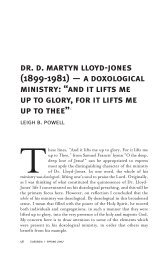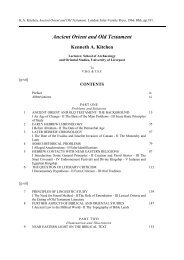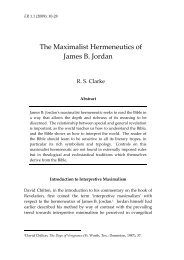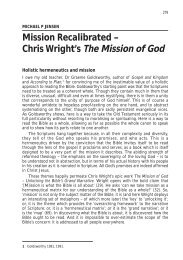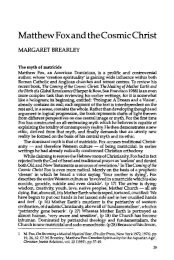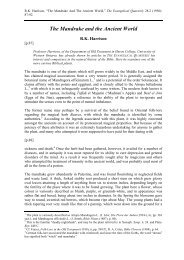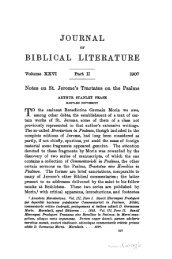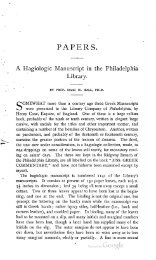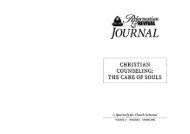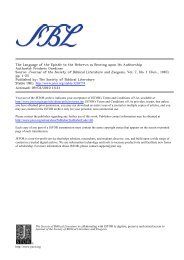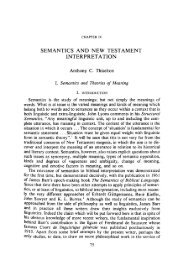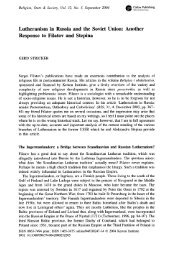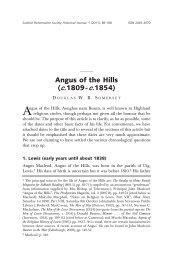'' Imitation of Christ as a Christian Lifestyle-Disembodied Fiction or ...
'' Imitation of Christ as a Christian Lifestyle-Disembodied Fiction or ...
'' Imitation of Christ as a Christian Lifestyle-Disembodied Fiction or ...
You also want an ePaper? Increase the reach of your titles
YUMPU automatically turns print PDFs into web optimized ePapers that Google loves.
aise questions about the validity <strong>of</strong> such a life apparently ·oblivious<br />
<strong>of</strong> events in the outside w<strong>or</strong>ld. Would this approach not involve<br />
dealing with theologically and psychologically dangerous ·abstractions?<br />
The other view would have us believe that De Foucauld's devotional<br />
life had no significant bearing on his behaviour, and that actions<br />
he interpreted <strong>as</strong> a following <strong>or</strong> imitation <strong>of</strong> <strong>Christ</strong> were no m<strong>or</strong>e than<br />
a result <strong>of</strong> interplay between heredity and environment. On this<br />
interpretation, "Once a soldier, always a soldier" would be an apt<br />
summary <strong>of</strong> his life, whilst his own outlook, "Once a monk, always a<br />
monk," should be discounted.<br />
Who then w<strong>as</strong> De Foucauld? W<strong>as</strong> he one <strong>or</strong> the other? W<strong>as</strong><br />
he sometimes one, and sometimes the other? 'vVere these different<br />
<strong>as</strong>pects <strong>of</strong> his personality kept separate <strong>or</strong> were they integrated?<br />
Examination <strong>of</strong> the two interpretations outlined above shows that<br />
they simplify matters through only considering part <strong>of</strong> the evidence.<br />
When all the material is put together a chronological development<br />
can be traced in De Foucauld's understanding <strong>of</strong> the imitatio <strong>Christ</strong>i<br />
and <strong>of</strong> himself which fits into his response to external events. On<br />
one hand, there w<strong>as</strong> a gradual simplification <strong>of</strong> his concept <strong>of</strong> the imitatio<br />
<strong>Christ</strong>i from very naive an'd complex beginnings; whilst on the<br />
other there w<strong>as</strong> a growing awareness that clues to .the application oi<br />
its central element-loving obedience to the Father-were to be found<br />
in the concrete realities <strong>of</strong> De Foucauld's own situation. The question<br />
to <strong>as</strong>k w<strong>as</strong> "What would Jesus do now?" and De Foucauld w<strong>as</strong> to<br />
respond with all that he w<strong>as</strong>,· to things <strong>as</strong> they -rWere.<br />
The imp<strong>or</strong>tant fact<strong>or</strong> that is overlooked in exclusively "religious"<br />
<strong>or</strong> "secular" interpretations <strong>of</strong> his life is that the two processes just<br />
mentioned were complementary. I F<strong>or</strong> in :responding "with all that<br />
he w<strong>as</strong>," De Foucauld w<strong>as</strong> respondirrg not only with what he w<strong>as</strong> by<br />
birth and upbringing and ,expeDience up to his conversion at age 28,<br />
but also with what he subsequently.becamethrough the long years <strong>of</strong><br />
following his conception <strong>of</strong> the miitatio <strong>Christ</strong>i. It is true that the<br />
drawing together <strong>of</strong> the two elements'w<strong>as</strong> a long, difficult and faltering<br />
spiritual pilgrimage f<strong>or</strong> De Foucaulcf which ·one would not hold out<br />
f<strong>or</strong> detailed emulation, but their ultimate recdnciliation is an <strong>as</strong>surance<br />
that the b<strong>as</strong>ic imitatio <strong>Christ</strong>i <strong>or</strong>ientation can lead, <strong>as</strong> tho New Testament<br />
and <strong>Christ</strong>ian spirituality have always affirmed, .to a balanced<br />
and mature <strong>Christ</strong>ian life.<br />
( - .<br />
II The C<strong>as</strong>e <strong>of</strong> Charles de l'oucauld<br />
Life<br />
Charles Eugene de Foucauld w<strong>as</strong> hom 15 September 1858 at<br />
Str<strong>as</strong>bourg, the great-great-grand nephew <strong>of</strong> the Archbishop <strong>of</strong> Aries<br />
who w<strong>as</strong> martyred along with his cousin and vicar-general, the blessed<br />
Armand de Foucauld de Pontbriand during the French Revolution.<br />
Whether <strong>or</strong> not tales <strong>of</strong> this great-great-grand uncle inspired Charles<br />
with his later longing f<strong>or</strong> martyrdom, there w<strong>as</strong> no e<strong>as</strong>y <strong>or</strong> dirett link<br />
91




